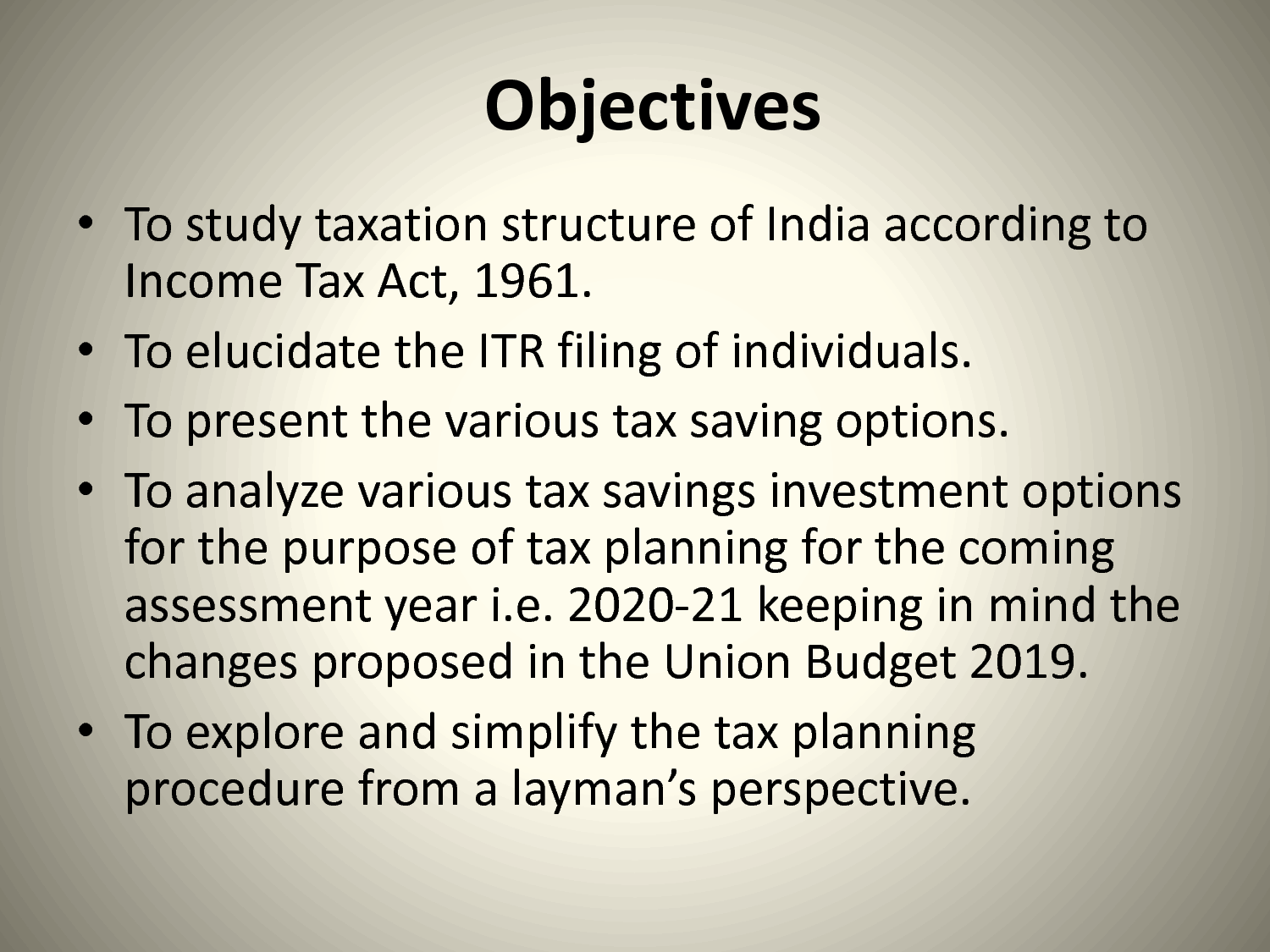

Finance
What Is The Purpose Of Tax Planning?
Published: January 21, 2024
Discover the importance of tax planning and its role in managing your finances. Learn how strategic tax planning can help reduce liabilities and maximize your financial goals.
(Many of the links in this article redirect to a specific reviewed product. Your purchase of these products through affiliate links helps to generate commission for LiveWell, at no extra cost. Learn more)
Table of Contents
Introduction
When it comes to managing your finances, tax planning plays a crucial role in ensuring that you make the most of your hard-earned money. Tax planning is the process of analyzing your financial situation from a tax perspective and implementing strategies to minimize your tax liability while remaining compliant with the law.
Whether you are an individual, a small business owner, or a large corporation, understanding tax planning can greatly benefit you. By strategically managing your taxes, you can save money, increase your financial stability, and achieve your long-term financial goals.
However, tax planning can be complex and overwhelming, as tax laws are constantly changing and can be difficult to navigate without the proper knowledge and expertise. That’s why it is essential to seek guidance from tax professionals who are well-versed in the intricate world of tax planning.
In this article, we will explore the purpose of tax planning and discuss its benefits. We will also provide insights into effective tax planning strategies and highlight the importance of consulting with tax professionals. By the end, you will have a clear understanding of why tax planning is essential and how it can positively impact your financial future.
Understanding Tax Planning
Tax planning is a proactive approach to managing your finances in a way that minimizes your tax liability while maximizing your tax savings. It involves analyzing your financial situation, understanding tax laws, and implementing strategies to legally reduce the amount of taxes you owe.
At its core, tax planning aims to optimize your financial decisions to achieve the best possible outcome in terms of taxes. It takes into account various factors such as your income, expenses, investments, deductions, and credits. By strategically organizing your finances, tax planning ensures that you take full advantage of available tax benefits and incentives.
Effective tax planning requires a deep understanding of tax laws and regulations. Tax professionals, such as accountants or tax advisors, can provide valuable guidance in navigating the complexities of the tax system. They stay updated with the latest changes in tax laws and help individuals and businesses make informed decisions to optimize their tax positions.
There are different types of taxes that individuals and businesses may be subject to, including income tax, property tax, sales tax, and estate tax, to name a few. Each tax type has its unique set of rules, deductions, and exemptions that can be utilized in tax planning.
It’s important to note that tax planning should be done within the limits of the law. Engaging in tax evasion or fraudulent activities is illegal and can lead to severe penalties and legal consequences. The goal of tax planning is to minimize your tax liability through legal means while maintaining compliance with tax laws.
Overall, understanding tax planning involves gaining knowledge of tax laws, optimizing financial decisions, and utilizing available deductions and credits to reduce taxes owed. By implementing effective tax planning strategies, you can optimize your financial situation and achieve your long-term financial goals while minimizing your tax burden.
Benefits of Tax Planning
Tax planning offers a wide range of benefits that can positively impact both individuals and businesses. Let’s explore some of the key advantages of engaging in tax planning:
- Minimizing Tax Liability: One of the primary goals of tax planning is to reduce the amount of taxes you owe. By identifying and utilizing available deductions, credits, and exemptions, you can effectively lower your taxable income and keep more money in your pocket.
- Maximizing Tax Savings: Through strategic tax planning, you can maximize your tax savings. By making informed financial decisions, such as investing in tax-efficient accounts or taking advantage of tax-advantaged retirement plans, you can optimize your tax situation and increase your overall savings.
- Ensuring Compliance with Tax Laws: Tax laws can be complex and ever-changing. Engaging in tax planning ensures that you remain compliant with the law while taking advantage of available tax benefits. By staying updated and seeking the guidance of tax professionals, you can avoid costly penalties and legal issues.
- Taking Advantage of Tax Incentives: Governments often provide tax incentives to individuals and businesses to encourage certain behaviors or activities. Tax planning allows you to identify and capitalize on these incentives, such as tax credits for energy-efficient home improvements or tax deductions for expenses related to education or healthcare.
- Improving Financial Stability: Effective tax planning can improve your financial stability and provide greater control over your finances. By minimizing your tax burden and maximizing your tax savings, you can free up funds for other purposes, such as saving for retirement, paying off debt, or investing in future business endeavors.
- Optimizing Estate Planning: Tax planning is crucial for individuals with significant assets who want to pass on their wealth to future generations. Through estate tax planning, you can strategize how to minimize estate taxes and ensure that your assets are distributed according to your wishes.
Overall, tax planning offers numerous benefits that can have a significant impact on your financial well-being. By taking a proactive approach to managing your taxes, you can minimize your tax liability, maximize your savings, and achieve long-term financial success.
Minimizing Tax Liability
One of the primary objectives of tax planning is to minimize your tax liability, which refers to the total amount of taxes you owe to the government. By employing various strategies and utilizing available tax deductions, credits, and exemptions, you can effectively reduce the amount of taxes you are required to pay.
Here are some key strategies to consider for minimizing your tax liability:
- Take advantage of deductions: Deductions are expenses that can be subtracted from your taxable income, thereby lowering your overall tax liability. Some common deductions include mortgage interest, property taxes, student loan interest, medical expenses, and charitable contributions. By keeping track of eligible deductions and maintaining proper documentation, you can maximize your deductible expenses and reduce your taxable income.
- Optimize tax credits: Unlike deductions, tax credits provide a dollar-for-dollar reduction in your tax liability. There are a variety of tax credits available, such as the Child Tax Credit, the Earned Income Tax Credit, and the Lifetime Learning Credit. By understanding the eligibility criteria and taking full advantage of these credits, you can significantly reduce your tax burden.
- Consider tax-efficient investments: Investing in tax-efficient vehicles, such as Individual Retirement Accounts (IRAs) or 401(k) plans, can provide tax advantages. Contributions made to these retirement accounts may be tax-deductible, and the investment growth is tax-deferred until withdrawals are made. By strategically allocating your investments in tax-efficient accounts, you can minimize your current tax liability and save for the future simultaneously.
- Utilize tax exemptions: Tax exemptions allow you to exclude certain types of income from being taxed. For instance, you may be eligible for exemptions related to child support, certain types of retirement income, or income earned from municipal bonds. Understanding the exemptions available to you can help reduce your overall taxable income and ultimately lower your tax liability.
- Plan your business structure: If you are a business owner, choosing the right business structure can have significant tax implications. Sole proprietorships, partnerships, corporations, and limited liability companies (LLCs) each have different tax rules. Consulting with a tax professional can help you determine the most tax-efficient business structure for your specific circumstances.
It is important to note that tax laws and regulations are subject to change, so it is advisable to stay updated and consult with a tax professional to ensure you are taking advantage of all available tax-saving opportunities. By implementing these strategies and staying proactive in managing your tax liability, you can minimize your tax burden and keep more of your hard-earned money.
Maximizing Tax Savings
In addition to minimizing your tax liability, tax planning also aims to maximize your tax savings. By employing various strategies and taking advantage of available tax incentives, you can optimize your financial position and keep more money in your pocket. Here are some key strategies to consider for maximizing your tax savings:
- Contribute to tax-advantaged accounts: Utilize tax-advantaged retirement accounts, such as Traditional IRAs, Roth IRAs, and 401(k) plans. Contributions to these accounts may be tax-deductible or grow tax-free, allowing you to save for retirement while reducing your taxable income.
- Take advantage of tax credits: Tax credits provide a direct reduction in your tax liability, meaning they have a greater impact than deductions. Familiarize yourself with tax credits available to you, such as the Child Tax Credit, the American Opportunity Credit for education expenses, or the Residential Energy Efficiency Property Credit for energy-efficient home improvements. By claiming these credits, you can significantly reduce your tax bill.
- Time your deductions and income: Strategically timing your deductions and income can help maximize your tax savings. For example, if you expect to be in a lower tax bracket next year, you may choose to defer income or accelerate deductible expenses into the following year to reduce your current tax liability.
- Utilize tax-advantaged savings accounts: Consider using Health Savings Accounts (HSAs) and Flexible Spending Accounts (FSAs) to save for medical expenses. Contributions to these accounts are tax-deductible or made with pre-tax dollars, and withdrawals for qualified medical expenses are tax-free.
- Invest in tax-efficient funds: Look for investments that are designed to be tax-efficient, such as index funds or tax-managed funds. These investments are structured to minimize taxable distributions, which can help maximize your after-tax returns.
- Explore tax deferral strategies: Depending on your financial situation, you may be able to defer taxes on certain assets or income. For example, if you have capital gains from investments, you may consider utilizing tax deferral strategies like a 1031 exchange or investing in Opportunity Zones to defer or reduce the tax on those gains.
It is important to note that the best strategies for maximizing tax savings will vary depending on your individual circumstances. It is recommended to consult with a tax professional who can provide personalized advice based on your specific financial situation and goals.
By implementing effective tax planning strategies and taking advantage of available tax savings opportunities, you can optimize your financial position, maximize your savings, and keep more of your hard-earned money in your pocket.
Ensuring Compliance with Tax Laws
When engaging in tax planning, it is crucial to prioritize compliance with tax laws. Staying within the legal boundaries not only protects you from penalties and legal consequences but also provides peace of mind knowing that your finances are in order. Here are some important considerations for ensuring compliance with tax laws:
- Stay informed about tax laws: Tax laws are subject to frequent changes and updates. It is essential to stay informed about the latest tax regulations and updates to ensure that you are aware of your rights and responsibilities as a taxpayer.
- Keep accurate and organized records: Maintaining proper records is essential for tax planning and compliance. Keep track of all relevant financial documents, such as income statements, expense receipts, investment records, and tax forms. Having organized records will make it easier to complete tax filings accurately and respond to any potential inquiries from tax authorities.
- Understand reporting requirements: Different tax laws have specific reporting requirements. Depending on your situation, you may need to report various types of income, deductions, and credits. Familiarize yourself with these requirements and ensure that you file the appropriate tax forms and disclosures in a timely and accurate manner.
- Consult with tax professionals: Tax professionals, such as accountants or tax advisors, play a vital role in ensuring compliance with tax laws. They have the expertise and knowledge to navigate complex tax regulations and can provide valuable advice regarding your specific tax situation. Working with a tax professional can help you stay compliant, maximize tax savings, and minimize the risk of errors when filing your tax returns.
- Avoid engaging in tax evasion: Engaging in illegal activities to avoid paying taxes, such as hiding income or inflating deductions, is tax evasion and is against the law. Tax evasion can result in severe penalties, fines, and even criminal charges. It is essential to comply with tax laws and use legal means to minimize your tax liability.
By prioritizing compliance with tax laws, you can ensure that your tax planning efforts are conducted within the legal framework. By staying informed, keeping accurate records, understanding reporting requirements, seeking professional advice, and avoiding illegal activities, you can maintain compliance, protect your financial well-being, and build a foundation for a secure financial future.
Taking Advantage of Tax Incentives
Tax incentives are provisions in the tax code that are designed to encourage specific behaviors, activities, or investments. By taking advantage of these tax incentives, individuals and businesses can reduce their tax liability and potentially increase their tax savings. Here are some key strategies for utilizing and benefiting from tax incentives:
- Research available tax incentives: Familiarize yourself with the tax incentives that are applicable to your situation. These incentives can be related to areas such as education, homeownership, energy-efficiency, renewable energy, research and development, and more. By understanding the available tax incentives, you can identify opportunities for potential tax savings.
- Claim tax credits: Tax credits are direct reductions in your tax liability. They can be highly beneficial in reducing your overall tax burden. Research and determine if you qualify for tax credits such as the Child Tax Credit, Earned Income Tax Credit, Residential Energy Credit, or other specific credits that align with your circumstances.
- Invest in tax-advantaged accounts: Contributing to tax-advantaged accounts, such as Health Savings Accounts (HSAs), Education Savings Accounts (ESAs), or 529 plans, can provide tax benefits. These accounts offer tax advantages such as tax-deductible contributions, tax-free growth, and tax-free withdrawals for qualified expenses in specific areas like healthcare or education.
- Consider tax-exempt investments: Certain investments, such as municipal bonds, offer tax-exempt income. Interest earned from municipal bonds is typically exempt from federal income tax and may also be exempt from state and local taxes, depending on where you reside. Investing in tax-exempt investments can help reduce your taxable income and potentially increase your after-tax returns.
- Take advantage of retirement account contributions: Contributions to retirement accounts, such as a Traditional IRA or a 401(k) plan, can provide both tax benefits and long-term financial security. These contributions are often tax-deductible or made with pre-tax dollars, reducing your current taxable income and allowing your investments to grow tax-deferred until you withdraw them during retirement.
Tax incentives can change over time and vary based on your individual circumstances and location. It is important to stay informed about current tax laws or consult with a tax professional who can guide you on the most relevant tax incentives for your financial situation.
By taking advantage of available tax incentives, you can significantly reduce your tax liability and increase your tax savings. It’s important to evaluate each opportunity carefully and ensure that you meet the eligibility criteria and comply with the requirements set forth by the tax incentives you choose to pursue.
Strategies for Effective Tax Planning
Effective tax planning involves implementing strategies that optimize your financial decisions and minimize your tax liability. By adopting these strategies, you can proactively manage your taxes and maximize your savings. Here are some key strategies to consider for effective tax planning:
- Stay organized: Keep your financial records well-organized and up-to-date. This includes maintaining documentation for income, expenses, deductions, and credits. Having organized records will make tax preparation easier and more accurate.
- Monitor tax law changes: Stay informed about changes in tax laws and regulations. Tax laws can evolve over time, and being aware of any updates can help you adapt your tax planning strategies accordingly. Consult with a tax professional who can guide you through these changes.
- Maximize deductions and credits: Identify all eligible deductions and tax credits that are applicable to your situation. Take advantage of these tax benefits to reduce your taxable income and overall tax liability. Properly document and report each deduction and credit to ensure compliance with tax laws.
- Plan your investments: Consider the tax implications of your investment decisions. Opt for tax-efficient investment vehicles, such as index funds or tax-managed funds, which are structured to minimize taxable distributions. Be mindful of the timing of buying or selling investments to manage capital gains and losses effectively.
- Utilize tax-advantaged accounts: Contribute to tax-advantaged accounts like Individual Retirement Accounts (IRAs), Health Savings Accounts (HSAs), or Education Savings Accounts (ESAs). These accounts offer tax advantages such as tax-deductible contributions, tax-free growth, or tax-free withdrawals for qualified expenses.
- Consider deferring or accelerating income: Depending on your financial situation, you may have the flexibility to defer or accelerate income. By timing the receipt or payment of certain income and expenses appropriately, you can manage your taxable income more efficiently.
- Consult with tax professionals: Seek advice from tax professionals, such as accountants or tax advisors, who have in-depth knowledge of tax laws and regulations. They can assist you in developing tailored tax planning strategies that align with your goals, ensure compliance, and maximize tax savings.
Every individual and business is unique, so it’s important to customize your tax planning strategies to suit your specific circumstances and financial goals. Regularly review and update your tax plan, especially as your financial situation changes or new tax laws come into effect.
By implementing these strategies and working with knowledgeable professionals, you can optimize your tax position, minimize your tax liability, and make informed financial decisions that align with your long-term goals.
Consulting with Tax Professionals
When it comes to effective tax planning, consulting with tax professionals can make a significant difference. Tax laws and regulations can be complex and ever-changing, making it challenging for individuals to navigate on their own. Here are some key reasons why it is valuable to seek the expertise of tax professionals:
- Specialized knowledge and experience: Tax professionals, such as certified public accountants (CPAs) or tax advisors, have a deep understanding of the intricacies of tax laws and regulations. They stay updated with the latest changes and developments in tax legislation, making them well-equipped to provide accurate and reliable advice.
- Personalized tax planning: Tax professionals can assess your specific financial situation and goals to develop a tailored tax plan. They consider various factors such as income, investments, deductions, credits, and long-term objectives to create a customized strategy that maximizes tax savings and minimizes liabilities.
- Identification of tax-saving opportunities: Tax professionals have the knowledge to identify all available tax deductions, credits, exemptions, and incentives that you may be eligible for. They can guide you through the process of claiming these benefits, ensuring that you take advantage of every opportunity to save on your tax bill.
- Compliance and accuracy: Keeping up with tax laws and regulations can be overwhelming for individuals who are not well-versed in tax matters. Tax professionals ensure that your tax planning and filings are compliant with the latest requirements, reducing the risk of errors or audits. They can also help you navigate complex tax forms and documentation, providing accurate and precise tax filings.
- IRS representation: In the event of an audit or any inquiry from the Internal Revenue Service (IRS), tax professionals can provide expert representation on your behalf. They have the knowledge and experience to communicate with tax authorities effectively, handle any disputes, and ensure a fair resolution.
- Peace of mind: Engaging a tax professional for your tax planning needs provides peace of mind. You can have confidence that your tax affairs are in order, maximizing your tax savings, and minimizing the risk of costly mistakes or penalties.
Given the complexities of tax planning, engaging a tax professional is a wise investment that can save you time, stress, and money in the long run. They can provide expert advice, accurate tax filings, and ongoing support to help you achieve your financial goals.
When choosing a tax professional, look for credentials, experience, and a track record of quality service. Building a relationship with a trusted tax professional can provide long-term benefits for your tax planning and financial needs.
Conclusion
Effective tax planning plays a crucial role in managing your finances and ensuring that you make the most of your hard-earned money. By strategically analyzing your financial situation, understanding tax laws, and implementing appropriate strategies, you can minimize your tax liability, maximize your tax savings, and achieve your long-term financial goals.
Through tax planning, you can take advantage of available deductions, credits, and exemptions to reduce your taxable income and overall tax burden. By staying informed about tax laws, organizing your financial records, and consulting with tax professionals, you can navigate the complexities of the tax system and remain compliant with tax regulations.
Tax planning also allows you to capitalize on various tax incentives designed to promote specific behaviors or activities. By identifying and utilizing these incentives, you can further reduce your tax liability and increase your tax savings. Whether it’s contributing to tax-advantaged accounts, taking advantage of tax credits, or investing in tax-efficient funds, tax planning offers a range of strategies to optimize your tax position.
While tax planning can be complex, consulting with tax professionals brings valuable expertise, personalized guidance, and peace of mind. Tax professionals have the knowledge and experience to develop customized tax plans, identify potential tax savings opportunities, ensure compliance, and represent you in case of an audit or inquiry.
In conclusion, implementing effective tax planning strategies and seeking professional advice can have a significant impact on your financial well-being. By minimizing your tax liability, maximizing your tax savings, and ensuring compliance with tax laws, you can optimize your financial position, increase your savings, and work towards a more secure and prosperous future.














